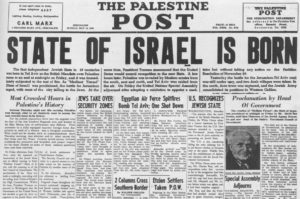 Austin scoffed at Arab claims that their armies had entered Palestine only for reasons of defense. “Defense against whom?” he asked. “Oh, Zionist bands of terrorists. It takes five armies surrounding this small area to overwhelm native bands in that little place, the size of my native State (Vermont).”
Austin scoffed at Arab claims that their armies had entered Palestine only for reasons of defense. “Defense against whom?” he asked. “Oh, Zionist bands of terrorists. It takes five armies surrounding this small area to overwhelm native bands in that little place, the size of my native State (Vermont).”
Click here to view the original article.
LAKE SUCCESS, May 28 (U.P.)-The Jews will turn down the British proposal for a four-week truce in Palestine if it is passed in the United Nations, Major Aubrey Eban, Israel’s representative, virtually promised the Security Council today.
The young delegate of the two-week-old Jewish state pointed out that the British plan would keep Israel from getting arms and reinforcements during the four-week cease-fire, while leaving the Arabs free to mass power in the neighboring states of Egypt, Trans-Jordan, Syria and Lebanon for a new attack the minute the four weeks were up.
“This draft resolution transports us into a world far remote from the principle and purposes of this organization,” Eban declared. “The Arabs are no longer called upon to adapt themselves to the will of the Security Council. The Security Council is called upon to adapt itself to the will of the Arab states.”
LOUD APPLAUSE
U. S. Delegate Warren Austin drew loud applause from the packed Security Council gallery when he announced, at the start of his speech, that “the United States supports the Soviet draft.”
Council President Alexandre Parodi of France interrupted to warn the audience against any further outbursts, saying he would have it ejected if there was any repetition.
Austin declared the Arabs were guilty of flagrant violation of the U. N. Charter in entering the Holy Land to destroy the new state of Israel.
Austin scoffed at Arab claims that their armies had entered Palestine only for reasons of defense.
“Defense against whom?” he asked. “Oh, Zionist bands of terrorists. It takes five armies surrounding this small area to overwhelm native bands in that little place, the size of my native State (Vermont).”
SITUATION WORSE
The American delegate said the situation had become worse since the cease-fire appeal passed Saturday.
U. N. observers believed only strong pressure by the United States on Council members who normally follow the American lead could win the necessary seven votes for the strong Russian approach.
It was believed in some quarters that the United States might in the end vote for the British ceasefire appeal once the Soviet plan was killed.
These were the tactics used last week after the Council failed to pass an American resolution on which the current Soviet move was modeled. The United States finally voted with the majority that called for an unconditional cease-fire, which the Jews accepted and the Arabs rejected.
BRITISH AGREE
A British spokesman lent indirect support to the theory that the United States might wind up voting for the new British cease-fire appeal, which contains conditions demanded by the Arabs.
The spokesman said the new British formula was “influenced” by the recent talks in London between American Ambassador Lewis Douglas and British Foreign Minister Bevin.
However, an American official refuted this theory by saying the United States had no advance warning of the latest British blueprint.
EBAN’S SPEECH
Eban spoke just before Austin. He said- “There was something technically admirable in the harmonious climax whereby Arab demands yesterday merged into the terms of this resolution.”
“The strident demand that Israel should adapt its policies of immigration and defense to the pressures of Arab violence was reiterated time and again by spokesmen of the Arab states,” he said. “By strange coincidence, the satisfaction of those two Arab demands forms the very crux and foundation of this draft resolution.”
Ukrainian Delegate Vassilly A. Tarasenko followed the same reasoning. He said the British plan was aimed at paying the way for U. N. punitive action against the Jews after they had, as they must, rejected the Arab-supported cease-fire call.